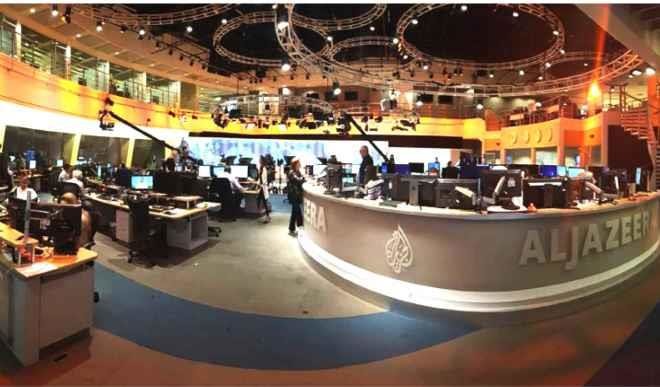Qatar-Gulf crisis: Criticisms trail call to shut Aljazeera
Last week, the four Arab countries that severed relations with Qatar, asked that Qatar shuts down the Al Jazeera network, and other news outlets that it funds, including Arabi21, Rassd, Al Araby Al Jadeed and Middle East Eye. The closure of the broadcaster is said to be one of 13-wide-ranging demands placed on Doha by […]


Last week, the four Arab countries that severed relations with Qatar, asked that Qatar shuts down the Al Jazeera network, and other news outlets that it funds, including Arabi21, Rassd, Al Araby Al Jadeed and Middle East Eye.
The closure of the broadcaster is said to be one of 13-wide-ranging demands placed on Doha by Saudi Arabia and its allies as the price for lifting their almost three-week-long “blockade” of Qatar.
Saudi Arabia, United Arab Emirates, Bahrain and Egypt, on June 5, announced the suspension of political, economic and diplomatic ties with Qatar in a coordinated move, accusing it of supporting “terrorism”.
Qatar, however, rejected the allegation, saying the measures were unjustified and based on false claims and assumptions.
The Saudi-led bloc closed their airspace to Qatari carriers and blocked the emirate’s only land border, a vital route for its food imports. They also ordered all Qataris to leave and their own nationals to return home.
Qatar’s National Human Rights Commission (NHRC) had threatened legal action against the four Arab nations, saying it would employ a Swiss law firm to seek compensation for those affected by the decision of the Gulf countries.
Al Jazeera says any move to shut it down is an attack on media freedom. In a statement, Al Jazeera said, “we assert our right to practice our journalism professionally without bowing to pressure from any government or authority.”
‘Blow to media pluralism’
Press freedom and human rights advocates, journalists and social media users have condemned the demand to shut Al Jazeera network and other media outlets in Qatar amid the diplomatic crisis.
Al Jazeera Media Network said it is deeply concerned about the measures taken by certain countries in the region to block access to the Networks’ websites, without any justification.
A statement by acting Managing Director of Aljazeera English Service, Giles Trendle, said authorities in these countries blocked Al Jazeera websites, on the pretext that ‘content does not comply with the standards of the regulatory authorities’ with no further details on the content or news resulting in this block.
Al Jazeera, he said, reaffirmed its stance of respecting the principles and standards of freedom of opinion and expression entitled by the International Human Rights law to seek and disseminate information.
“Al Jazeera denounces the encouragement of the hate speech by media organizations in those countries, without regards for the values of solidarity that should be respected in addressing political regimes-led smear campaigns against Al Jazeera today and could be against those organizations in the future.
“Al Jazeera Media Network believes that the policy of blocking and banning websites has become outdated in the open space era since the digital platforms have already become available for all everywhere,” he added.
He appealed to the international and local media organizations; bodies concerned with the promotion of freedom of opinion and expression to work hard to stop the blockage.
According to him, such violations certainly are against the media freedom, which is the cornerstone of human rights and public liberties.
A United Nations media rights expert called the Saudi-led demand to shut down Al Jazeera, “a major blow to media pluralism”.
David Kaye, the UN Special Rapporteur on freedom of opinion and expression, said in a statement that the closure call “represents a serious threat to media freedom if states, under the pretext of a diplomatic crisis, take measures to force the dismantling of Al Jazeera”.
Alexandra El Khazen, head of Middle East and North Africa desk at Reporters Without Borders, said “we are really worried about the implication and consequences of such requirements if they will ever be implemented.”
UK’s National Union of Journalists, in a statement by its president, Tim Dawson, expressed “absolute horror” over what they called a “monstrous request” by the Gulf countries to shut Aljazeera and urged them to withdraw the demands.
“The UAE and Saudi demand that Qatar shut down Al Jazeera doesn’t just punish Qatar; it punishes the millions of Arabs in the region from important news coverage. This is just an attempted expansion of the cowardly censorship they have inflicted on their own citizens, but it will fail,” said Sarah Leah Whitson, Middle East and North Africa director of Human Rights Watch.
The Committee to Protect Journalists (CPJ) criticised “the use of news outlets as a bargaining chip” and “urged all countries involved in this dispute to stop holding media hostage” to political rivalries.
It said the demand to shut Aljazeera showed “clear contempt for the principle of press freedom”.
“The Gulf region needs a vibrant free press and news outlets based there must be allowed to report freely,” said Joel Simon, the executive director of CPJ.
The Guardian, a UK-based newspaper, called the Aljazeera closure call “muzzling journalism”.
“The attack on Al Jazeera is part of an assault on free speech to subvert the impact of old and new media in the Arab world. It should be condemned and resisted,” the newspaper said in an editorial.
The Norwegian Press Association, the Norwegian Union of Journalists and Association of Norwegian Editors voiced their condemnation over what they called “outrageous attempt to censure public debate.”
“The signatory organisations strongly encourage the authorities of Saudi Arabia to respect that media, editors and journalists every day make an important contribution of keeping the people in the Arab countries and in the rest of the world informed of what is happening,” the three associations said.
